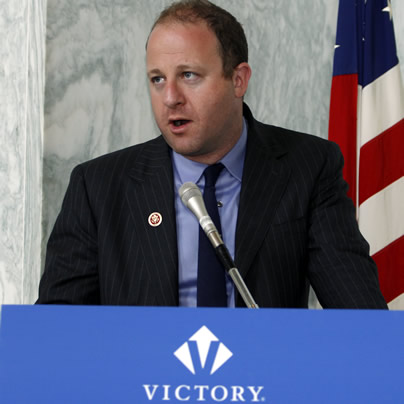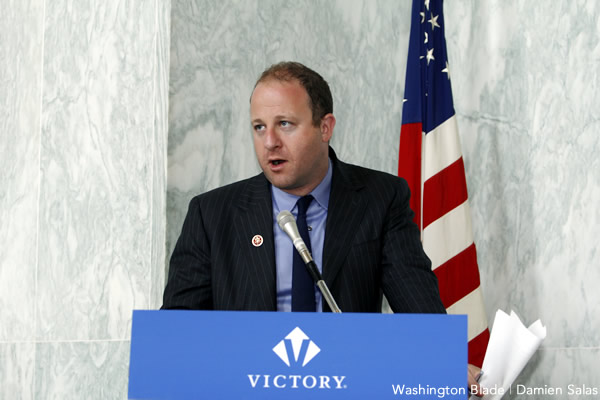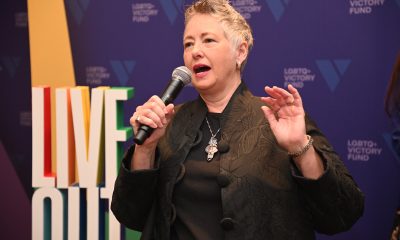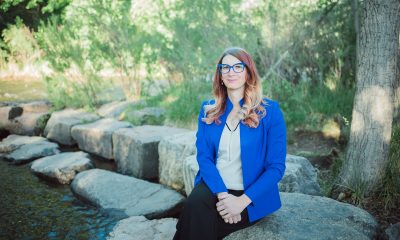News
Polis, Miller seek House hearing on ENDA
Lawmakers say chamber should act “in meaningful way” against LGBT workplace discrimination

In an attempt to build off the momentum of a successful Senate committee vote, Rep. Jared Polis (D-Colo.) and the lead House Democrat on workplace issues are calling for a House hearing on the Employment Non-Discrimination Act.
In an open letter dated July 11, Polis, who’s gay and lead sponsor of ENDA in the U.S. House, and Rep. George Miller (D-Calif.), the top Democrat on the House Education & the Workforce Committee, seek a hearing in the Republican-controlled House on ENDA. The letter is addressed to Chairman John Kline (R-Minn.).
“It is time for this committee and this Congress to act in a meaningful way and ensure that LGBT individuals are not denied the right to work and earn a living because of their sexual orientation or gender identity,” Polis and Miller write.
The letter comes on the heels of a successful vote on ENDA in the Senate Health, Education, Labor & Pensions Committee in which 12 Democrats were joined by Sens. Mark Kirk (R-Ill.,) Orrin Hatch (R-Utah) and Lisa Murkowski (R-Alaska) in voting in favor of the bill.
Polis and Miller emphasize that a House hearing on ENDA would capitalize on the momentum that the measure enjoys after the committee vote in the Senate.
“The vote sends a strong message that employment decisions should be based on merit and not prejudice,” Polis and Miller write. “The House must seize the moment and stand on the side of fairness and equality by holding a hearing that will kick start the process of moving this important legislation through this body.”
The last time the House held a hearing on ENDA was in 2009. Democrats at the time were in control of the chamber and Miller was chair of the committee, which was then known as the House Education & Labor Committee.
Kline’s office didn’t immediately respond to a request to comment. The Minnesota lawmaker voted against a version of the legislation in 2007 and he spoke out against ENDA during the hearing in 2009.
“H.R. 3017 represents a significant departure from longstanding civil rights law,” Kline said at the time. “It creates an entirely new protected class that is vaguely defined and often subjective.”
Tico Almeida, president of Freedom to Work, said Polis and Miller “should be commended” for acting quickly in the aftermath of the Senate committee vote on ENDA.
But in the event that Kline is unresponsive, Almeida invited Polis and Miller to ask Rep. Rob Andrews (D-N.J.,) a committee member with experience on ENDA, to hold a hearing on the legislation in the House Democratic Steering & Policy Committee, which Andrews co-chairs.
“The Democrats could set that hearing without Republican approval for September or October, and they could call two or three LGBT victims of workplace discrimination and some pro-LGBT business leaders to testify about how ENDA is good for business,” Almeida said. “I’d love to see the Democrats invite Exxon’s CEO to testify and explain why they refuse to adopt the same LGBT fairness policies that competitors like Chevron have adopted.”
Such a hearing, Almeida said, would lay the foundation for a successful discharge petition on ENDA in the House and a successful Senate floor vote between 60 and 70 votes.
The complete letter from Polis and Miller follows:
July 11, 2013
The Honorable John Kline
Chairman
Committee on Education and the Workforce
2181 Rayburn House Office Building
Washington, D.C. 20515Dear Chairman Kline:
We write to respectfully request that you hold a committee hearing as soon as possible on H.R. 1755, the Employment Non-Discrimination Act (ENDA), legislation that would end employment discrimination on the basis of sexual orientation and gender identity and make clear that Americans in the workplace should be judged on whether they can do the job.
We believe that the strong bipartisan vote by the Senate Health, Education, Labor and Pensions (HELP) on June 10in favor of ENDA reflects the overwhelming consensus that LGBT Americans should have the freedom to work and be full participants in our economy. The vote sends a strong message that employment decisions should be based on merit and not prejudice. The House must seize the moment and stand on the side of fairness and equality by holding a hearing that will kick start the process of moving this important legislation through this body.
As you may know, H.R. 1755 enjoys bipartisan support in the House and currently has 177 cosponsors. The legislation would prohibit employers from firing, refusing to hire, or discriminating against those employed or seeking employment, on the basis of their perceived or actual sexual orientation or gender identity. Such protections are already in place prohibiting discrimination based on race, religion, gender, national origin, age, and disability. More than 85 percent of Fortune 500 companies already extend workplace protections based on sexual orientation and more than one-third on the basis of gender identity.
Chairman Kline, business leaders, advocates, and an overwhelming supermajority of Americans – nearly 75 percent – support prohibiting employment discrimination on the basis of sexual orientation and gender identity. It is time for this Committee and this Congress to act in a meaningful way and ensure that LGBT individuals are not denied the right to work and earn a living because of their sexual orientation or gender identity.
We look forward to working with you on this and many other issues important to our nation.
Sincerely,
GEORGE MILLER
Senior Democratic Member
JARED POLIS
Member of Congress
District of Columbia
Taste of Point returns at critical time for queer students
BIPOC scholar to speak at Room & Board event on May 2

The Point Foundation will kick off May with its annual Taste of Point DC event. The event will be hosted at Room & Board on 14th Street and feature a silent auction, food tastings, a speech from a scholar, and more.
Point’s chief of staff, Kevin Wright, said that at Taste of Point, the scholars are the star of the show.
“People never come to an event to hear Point staff speak, they come to hear from the people most impacted by the program,” he said. “At its core Taste of Point is designed to center and highlight our scholars’ voices and experiences.”
This year, a Point BIPOC Scholar, Katherine Guerrero Rivera will speak at the event.
“It is a great opportunity to highlight the scholars out there on the front lines making impacts in almost every sector and job field,” Wright said.
Wright pointed out that this year especially is a pivotal time for LGBTQ students.
“In 2023, there were 20 states that passed anti-LGBTQ legislation,” he said. “By this point in [2024] we already have more.”
Wright said the impacts of those legislative attacks are far reaching and that Point is continuously monitoring the impact they have on students on the ground.
Last month, The Washington Post reported that states with anti-LGBTQ laws in place saw school hate crimes quadruple. This report came a month after a non-binary student, Nex Bennedict, died after being attacked at school.
“So, we see this as a critical moment to really step up and help students who are facing these challenges on their campus,” Wright said. “Our mission is to continue to empower our scholars to achieve their full academic and leadership potential.”
This year Point awarded nearly 600 LGBTQ students with scholarships. These include the flagship scholarship, community college scholarship and the BIPOC scholarship. When the foundation started in 2002, there were only eight scholarships awarded.
Dr. Harjant Gill is one of those scholars who said the scholarship was pivotal for him. Gill said he spent his undergraduate years creating films and doing activism for the LGBTQ community.
As a result, his academic record wasn’t stellar and although he was admitted into American University’s graduate program he had no clue how he would fund it.
Upon arrival to American he was told to apply for a Point scholarship and the rest was history.
“It ended up being the one thing that kept me going otherwise I would have dropped out,” he said. “Point was incredibly instrumental in my journey to becoming an academic and a professor.”
More than a decade later, Gill serves on the host committee for Taste of Point and is a mentor to young Point scholars. He said that he donates money yearly to Point and that when he is asked what he wants for a gift he will often tell his friends to donate too.
To attend the event on Wednesday, May 2, purchase tickets at the Point website. If you can’t attend this year’s Taste of Point DC event but would like to get involved, you can also donate online.
State Department
State Department releases annual human rights report
Antony Blinken reiterates criticism of Uganda’s Anti-Homosexuality Act

Secretary of State Antony Blinken on Monday once again reiterated his criticism of Uganda’s Anti-Homosexuality Act upon release of the State Department’s annual human rights report.
“This year’s report also captures human rights abuses against members of vulnerable communities,” he told reporters. “In Afghanistan, the Taliban have limited work opportunities for women, shuttered institutions found educating girls, and increasing floggings for women and men accused of, quote, ‘immoral behavior,’ end quote. Uganda passed a draconian and discriminatory Anti-Homosexuality Act, threatening LGBTQI+ individuals with life imprisonment, even death, simply for being with the person they loved.”
Ugandan President Yoweri Museveni last May signed the law, which contains a death penalty provision for “aggravated homosexuality.”
The U.S. subsequently imposed visa restrictions on Ugandan officials and removed the country from a program that allows sub-Saharan African countries to trade duty-free with the U.S. The World Bank Group also announced the suspension of new loans to Uganda.
Uganda’s Constitutional Court earlier this month refused to “nullify the Anti-Homosexuality Act in its totality.” More than a dozen Ugandan LGBTQ activists have appealed the ruling.
Clare Byarugaba of Chapter Four Uganda, a Ugandan LGBTQ rights group, on Monday met with National Security Council Chief-of-Staff Curtis Ried. Jay Gilliam, the senior LGBTQI+ coordinator for the U.S. Agency for International Development, in February traveled to Uganda and met with LGBTQ activists who discussed the Anti-Homosexuality Act’s impact.
“LGBTQI+ activists reported police arrested numerous individuals on the basis of their sexual orientation or gender identity and subjected many to forced anal exams, a medically discredited practice with no evidentiary value that was considered a form of cruel, inhuman, and degrading treatment and could amount to torture,” reads the human rights report.
The report, among other things, also notes Ugandan human rights activists “reported numerous instances of state and non-state actor violence and harassment against LGBTQI+ persons and noted authorities did not adequately investigate the cases.”
Report highlights anti-LGBTQ crackdowns in Ghana, Hungary, Russia
Ghanaian lawmakers on Feb. 28 approved the Promotion of Proper Human Sexual Rights and Ghanaian Family Values Bill. The country’s president, Nana Akufo-Addo, has said he will not sign the measure until the Ghanaian Supreme Court rules on whether it is constitutional or not.
The human rights report notes “laws criminalizing consensual same-sex sexual conduct between adults” and “crimes involving violence or threats of violence targeting lesbian, gay, bisexual, transgender, queer or intersex persons” are among the “significant human rights issues” in Ghana.
The report documents Hungarian Prime Minister Viktor Orbán and members of his right-wing Fidesz party’s continued rhetoric against “gender ideology.” It also notes Russia’s ongoing crackdown against LGBTQ people that includes reports of “state actors committed violence against LGBTQI+ individuals based on their sexual orientation or gender identity, particularly in Chechnya.”
The report specifically notes Russian President Vladimir Putin on July 24 signed a law that bans “legal gender recognition, medical interventions aimed at changing the sex of a person, and gender-affirming care.” It also points out Papua New Guinea is among the countries in which consensual same-sex sexual relations remain criminalized.

The Cook Islands and Mauritius in decriminalized homosexuality in 2023.
The report notes the Namibia Supreme Court last May ruled the country must recognize same-sex marriages legally performed outside the country. The report also highlights the Indian Supreme Court’s ruling against marriage equality that it issued last October. (It later announced it would consider an appeal of the decision.)
Congress requires the State Department to release a human rights report each year.
The Biden-Harris administration in 2021 released a memorandum that committed the U.S. to promoting LGBTQ+ and intersex rights abroad.
The full report can be read here.

Dominica’s High Court of Justice on Monday struck down provisions of a law that criminalized consensual same-sex sexual relations.
A gay man who remains anonymous in 2019 challenged sections of the country’s Sexual Offenses Act that criminalized anal sex and “gross indecency” with up to 10 years and 12 years in prison respectively. The plaintiff argued the provisions violated his constitutional rights.
The Dominica Equality and Sexual Expression Association and the Eastern Caribbean Alliance for Diversity and Equality, a group that advocates for LGBTQ and intersex rights in the region, in a press release noted the court in its ruling affirmed “the criminalization of consensual same-sex activity between adults is unconstitutional.” The groups added Justice Kimberly Cenac-Phulgence “declared that the laws commonly known as buggery and gross indecency laws, contravenes the constitution of the Commonwealth of Dominica, namely the right to liberty, freedom of expression, and protection of personal privacy.”
“It is long past time that the dignity and dreams of all Dominicans were recognized,” said DESEA Executive Director Sylvester Jno Baptiste in the press release. “We are all God’s children, and he loves us all equally. Laws that treat some Dominicans as less than others, have no place in a just society.”
Dominica is a former British colony that is located between Guadeloupe and Martinique in the Lesser Antilles.
Antigua and Barbuda, St. Kitts and Nevis, Barbados, and Trinidad and Tobago in recent years have decriminalized consensual same-sex sexual relations.
The Inter-American Commission on Human Rights in 2021 issued a decision that said Jamaica must repeal its colonial-era sodomy law. The country’s Supreme Court last year ruled against a gay man who challenged it.
A judge on St. Vincent and the Grenadines’s top court in February dismissed two cases that challenged the country’s sodomy laws.
“Decriminalization helps create an environment where LGBTQ individuals can live openly without fear of persecution, enabling them to access health care, education, and employment without facing discrimination,” said Outright Executive Director Maria Sjödin on Monday in response to the Dominica ruling. “The repeal of these discriminatory laws is a testament to the tireless efforts of activists, advocates, and allies who have long fought for justice and equality. It is a victory for human rights and a significant milestone in the ongoing struggle for LGBTQ rights in the Caribbean.”
-

 South America4 days ago
South America4 days agoDaniel Zamudio murderer’s parole request denied
-

 Maryland5 days ago
Maryland5 days agoMontgomery County police chief discusses arrest of trans student charged with planned school shooting
-

 Commentary5 days ago
Commentary5 days agoWorld ‘isn’t much different today’
-

 State Department20 hours ago
State Department20 hours agoState Department releases annual human rights report












